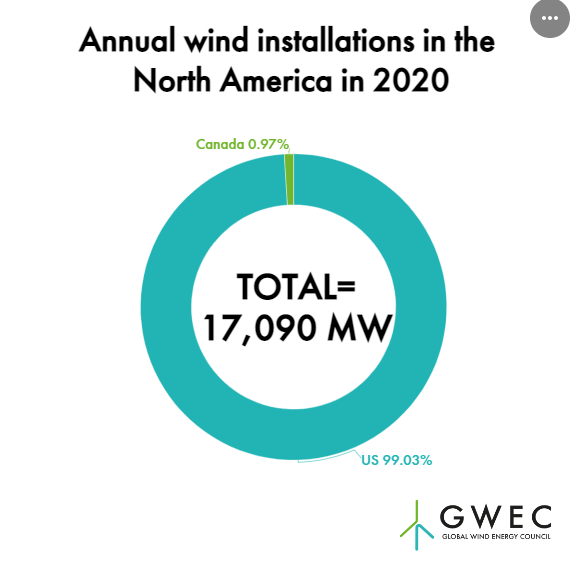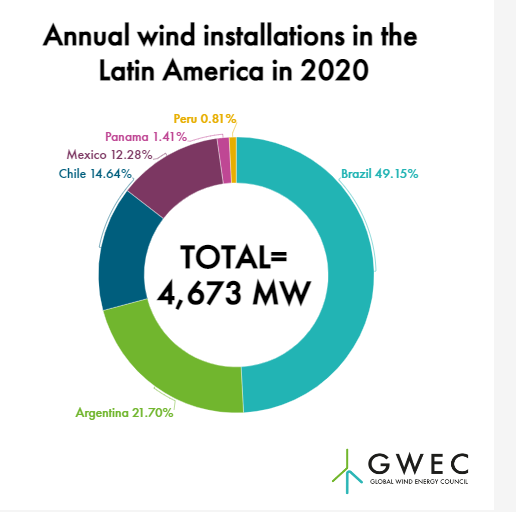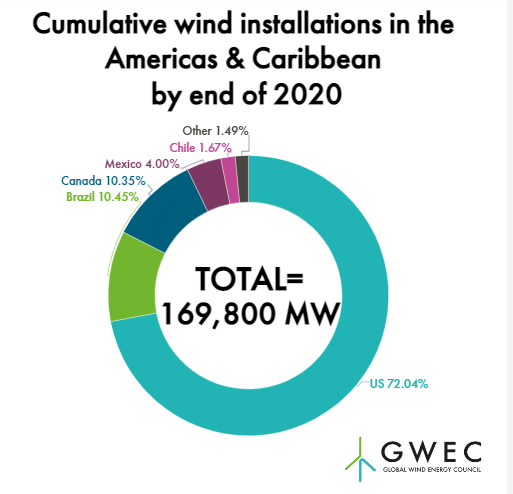The US drove the record growth in North America installing nearly 17 GW of new capacity in 2020, with more capacity installed in Q4 2020 than was installed the entire year in 2019.
Brazil continues to lead wind power growth in Latin America with 2.3 GW of new capacity in 2020, with record years in both Argentina and Chile helping to make 2020 the best year ever for wind power in the region.
Total wind power capacity in North and Latin America is now 136 GW and 34 GW respectively, helping to avoid 250 million tonnes of C02 emissions annually – equivalent to taking 1.2 billion passenger cars off the road.
11 March 2021, Brussels – According to the latest data released by GWEC Market Intelligence, 2020 was a record year for wind power growth in both North and Latin America, with nearly 22 GW of capacity installed despite COVID-19 impacts, demonstrating the incredible resilience of the wind industry and solidifying its crucial role in the region.
In 2020, the US blew past all previous records for wind power, installing more capacity in Q4 2020 than was installed the entire year in 2019. Altogether, a whopping 17 GW of new wind power capacity was installed last year in the US, an impressive 85 per cent year-on-year increase. The main driver of this growth surge was the phase-out of the 100 per cent Production Tax Credit (PTC) at the end of 2020 for wind power projects that began construction in 2016.
4 March 2021, Brussels – According to the latest data released by GWEC Market Intelligence, the Africa and Middle East region installed 821 MW of new wind power capacity in 2020, bringing total capacity in the region to over 7 GW. While this growth is stable for the region and nearly the same levels of the previous year despite COVID-19 impacting supply chains and project installation in key markets, wind power’s potential in the region is barely scratching the surface.
According to a report published by the IFC, the African continent alone has over 59,000 GW of technical wind resource potential – enough to power the continent’s energy demand 250 times over. Yet, current installed wind power capacity in Africa only accounts for 0.01 per cent of this potential.

Looking to Latin America, Brazil continues to lead the way for wind power in the region with 2.3 GW of new capacity installed in 2020. Record years in Argentina (1 GW) and Chile (684 MW) helped to further drive growth in the region last year, as wind power development in Mexico – one of the region’s largest wind power markets – slowed down due to several political challenges for the sector.

Overall, the total wind power capacity in North and Latin America is now 136 GW and 34 GW respectively, which helps to avoid 250 million tonnes of C02 emissions annually in the region – equivalent to taking 1.2 billion passenger cars off the road.
Feng Zhao, Head of Market Intelligence and Strategy at GWEC commented: “Since 2010, the wind power market in the US has tripled in size and nearly quadrupled its share in the country’s electricity mix. Although we were expecting an installation rush in the US in 2020, this growth is truly impressive considering the impacts of COVID-19 on the country’s supply chain and economy. The 17 GW of wind power capacity added to the American grid last year is enough to power 5 million American homes with clean, sustainable, and reliable energy, which has become increasingly important in the US considering the impact of the recent power outages.”
“Wind power is also an important driver of jobs and investment in the US, and a crucial pillar of the Biden administration’s plan to Build Back Better. Currently, wind power supports over 120,000 jobs and has brought in over US$65 billion over the past five years in the US. These socioeconomic benefits will be amplified once the US offshore wind market takes off, which could generate an additional US$166 billion in new investment by 2022 and support 80,000 jobs annually by 2035”, he added.

Ramón Fiestas, Chair of GWEC’s Latin America Task Force added: “The wind power market in Latin America has grown sixteen-fold over the past decade, and is the fastest growing power source in the region. However, the key challenge now is maintaining this consistent growth in the region’s established wind energy markets such as Brazil, Argentina, Mexico, and Chile in order to decarbonise the region’s energy system at the pace needed to achieve our Paris Agreement targets. It is crucial these challenges are addressed now to ensure a long-term pipeline and capitalise on the impressive growth momentum in the region”.
“Latin America was one of the region’s hardest hit economically from the COVID-19 crisis, and the fact that it was a record year for wind power despite these impacts is a true testament to the resilience of the industry and its leading role in powering a green recovery. Scaling up wind power in the region will not only create important local jobs and investment, but will significantly increase the region’s energy security and reduce carbon emissions to protect the region against future economic shocks such as fossil fuel volatility and environmental disasters, which are both becoming more and more frequent in the region”, he added.
Annex
New Wind Power Capacity in the Americas and Caribbean in 2020
US – 16,925 MW
Brazil – 2,297 MW
Argentina – 1,014 MW
Chile – 684 MW
Mexico – 574 MW
Canada – 165 MW
Panama – 66 MW
Peru – 38 MW
Top 5 Wind Markets in the Americas and Caribbean for Cumulative Capacity
US – 122,317 MW
Brazil – 17,750 MW
Canada – 17,578 MW
Mexico – 6,789 MW
Chile – 2,829 MW
Cumulative Wind Power Capacity by Region
North America – 135,894 MW
Latin America – 33,906 MW